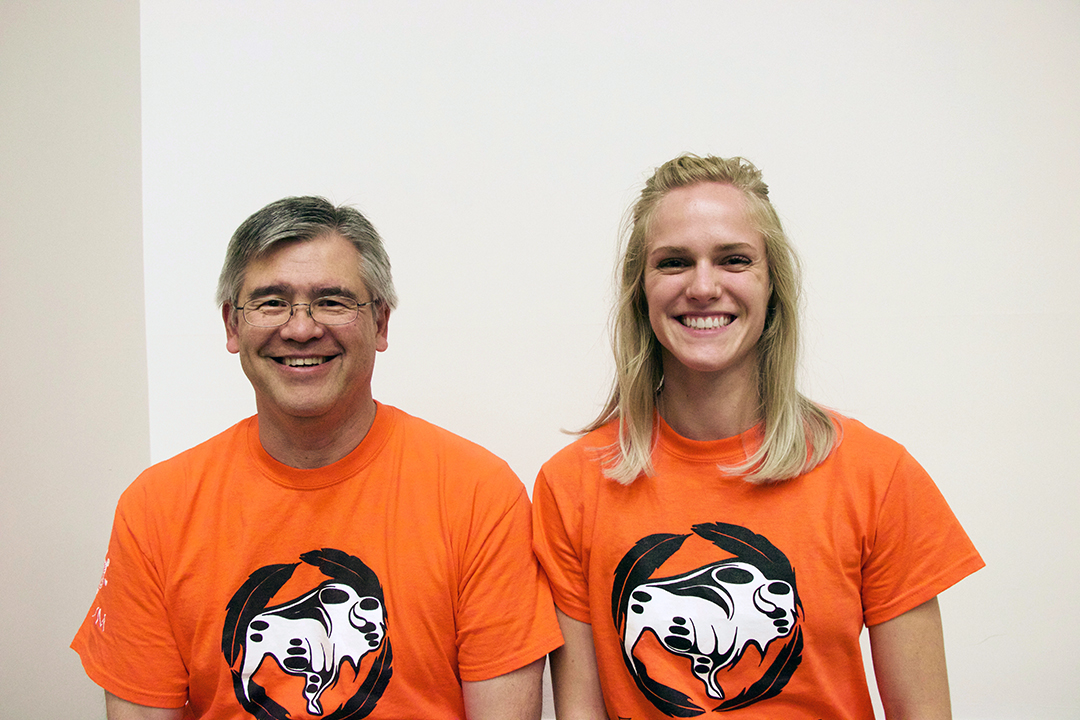
WCVM embraces Orange Shirt Day
Students, staff and faculty at the Western College of Veterinary Medicine (WCVM) will be wearing their commitment to reconciliation this fall.
By WCVM TodayThe entire college community will participate in Canada’s annual Orange Shirt Day on Sept. 29 and 30. The orange shirts will be the official uniform for Vetavision – a student-run public open house that typically sees thousands of visitors.
Orange Shirt Day began in 2013 after a commemoration event for the St. Joseph Mission residential school in Williams Lake, B.C. The idea for the special day came after a residential school survivor named Phyllis (Jack) Webstad shared her story of having her new orange shirt taken away from her on her first day of school.
Organizers chose Sept. 30 as the annual Orange Shirt Day because it occurs during the time of year when many Indigenous students were taken from their homes to residential schools.
Participation in Orange Shirt Day has since spread to communities across Canada, and the WCVM is the first college at the University of Saskatchewan (U of S) to officially take part.
The WCVM’s unique T-shirt design was created by a group of students that make up the WCVM’s Indigenous Students Circle in collaboration with Jasyn Lucas and Nicole Brightnose, two artists based in Thompson, Man.
Each element of the shirt has a meaning that comes from the Seven Sacred Teachings, values based in Indigenous cultural tradition. Each of these teachings are represented by an animal. The shirt features a white buffalo, four eagle feathers in a circle, and a turtle.
“The white buffalo comes from this old sacred tale about a White Buffalo Calf Woman,” says Samantha Bray, a second-year veterinary student and member of the students’ circle. “Essentially she brought the First Nations people sacred ceremonies and sacred medicines, and showed them how to use them. The white buffalo is our main symbol for the shirt.”
Bray is from Winnipeg and a member of the Stellat’en First Nation. She helped create the posters that will be placed around the college explaining the significance of the shirt’s symbols.
The eagle embodies love – in particular children are to be loved and cherished as gifts from the creator. The four eagle feathers in a circle represent the four directions of the Medicine Wheel. Each direction can also represent stages of life, sacred medicines, seasons of the year, phases of life, or elements of nature. The turtle symbolizes truth.
“The overall theme is contributing to the spirit of reconciliation,” says Dr. Andy Allen, chair of the Dean’s Committee on Indigenous Engagement. He worked to get the college involved with the help of the WCVM’s Indigenous Students’ Circle.
WCVM’s participation in the event will help to acknowledge the harm caused by the residential school system, to honour the survivors and to remember those that did not survive.
Each shirt says “Every child matters,” a phrase reminding everyone that “we have hope for every child’s prosperity and success in the future,” says Allen.
The fact that the WCVM students agreed to make Orange Shirt Day part of the Vetavision event is significant for both Allen and Bray.
“Personally, I think it’s just a way to recognize that we are moving toward reconciliation. It’s important for my classmates to see and recognize the struggles that First Nation people have been through. For me, it’s almost like being accepted into the community,” says Bray.
“I think being an Indigenous student and coming to this university, especially in the vet school, there’s not many other Indigenous students. I think it’s nice to see my classmates acknowledge the fact that there was residential schools and there was abuse, and seeing that they are able to acknowledge it in a way that brings light to the issues.”
Student Katya Melnick is a Métis person and another member of the college’s Indigenous Students’ Circle. She helped design the shirt and says the event represents a way to create understanding about the legacy of residential schools.
“I think it shows that we are acknowledging and understanding some of the issues people went through in the past with residential schools and the bullying that still happens due to racism,” she says.
“I feel like the orange T-shirt symbolizes something that was taken away from an Aboriginal child. Now I hope that we’re going through a path that we’re trying to give back.”
So far, the WCVM’s orange T-shirt has received a lot of positive feedback, with people from across Canada asking how to get one. Organizers hope the veterinary college’s example will inspire other colleges across the U of S campus to get involved.
Visit the Orange Shirt Day web site for more information.
